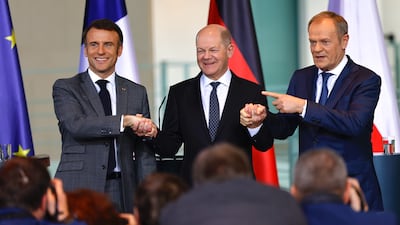The leaders of Germany, France and Poland agreed a way forward on Friday to put their differences aside and provide more weapons, including long-range missiles, to Ukraine.
The European allies will buy more equipment for Ukraine on the world market as they send a message to Russia that western support will “not let up”, said German Chancellor Olaf Scholz.
Defence chiefs will find ways of improving Ukraine's long-range artillery in a new “capability coalition” as part of their regular Ramstein airbase meetings, he said.
More arms production is also envisaged within Ukraine, while EU countries will consider using frozen Russian assets to pay for military aid.
The plans emerged from hastily arranged talks in Berlin after cracks emerged in Germany, France and Poland's position on the war.

The three leaders sought to smooth over differences after Mr Scholz blocked the delivery of long-range Taurus missiles and French President Emmanuel Macron suggested Nato troops could deploy to Ukraine.
Polish Prime Minister Donald Tusk, who had called for “less words, more ammunition” in the build-up to the talks, said allies were now ready to “put our money where our words are”.
“Everything we decided today in an excellent atmosphere shows clearly that the ugly rumours of disagreements among us, among the capitals in Europe, are false,” he said.
The “Weimar Triangle” meeting took place as Russians began voting in an election that is all but certain to hand President Vladimir Putin another six years in power.
Moscow has been gaining confidence as Ukraine hits dead ends on the battlefield, the EU's ammunition supply falls short of targets, and US aid is held up in Congress.
The G7 countries separately urged Iran on Friday not to add to Russia's ballistic missile stockpile after it previously supplied drones to the Kremlin.
Any such donation “would add to regional destabilisation and represent a substantive material escalation in its support for Russia's war in Ukraine,” they said.
European powers are eager to stress their resolve on Ukraine, with new arms purchases expected to come from countries with larger stockpiles.
“The Russian president must know we will not let up in our support. We stand united and unbreakably on Ukraine's side,” said Mr Scholz.

The German Chancellor, who opposes sending the Taurus missiles because it might require German troops to help select targets, also stressed that “we are not at war with Russia”.
Mr Macron said western allies would do nothing to escalate the conflict but repeated his warnings that all of Europe should regard its security as under threat from Russia.
“Our solidarity with Ukraine's people and its territorial integrity is unshakeable, but we also act because their security is at stake as well as the security of the whole of Europe,” he said.
“We see the situation in Ukraine in the same fashion. It’s an important time that we are living through but we are going to be up to it.”
Germany maintains that western troops should not deploy to Ukraine, said Mr Scholz's spokesman. But he warned against efforts at amateur psychology when it comes to the French and German leaders.
“The two men like each other very much,” he said.


